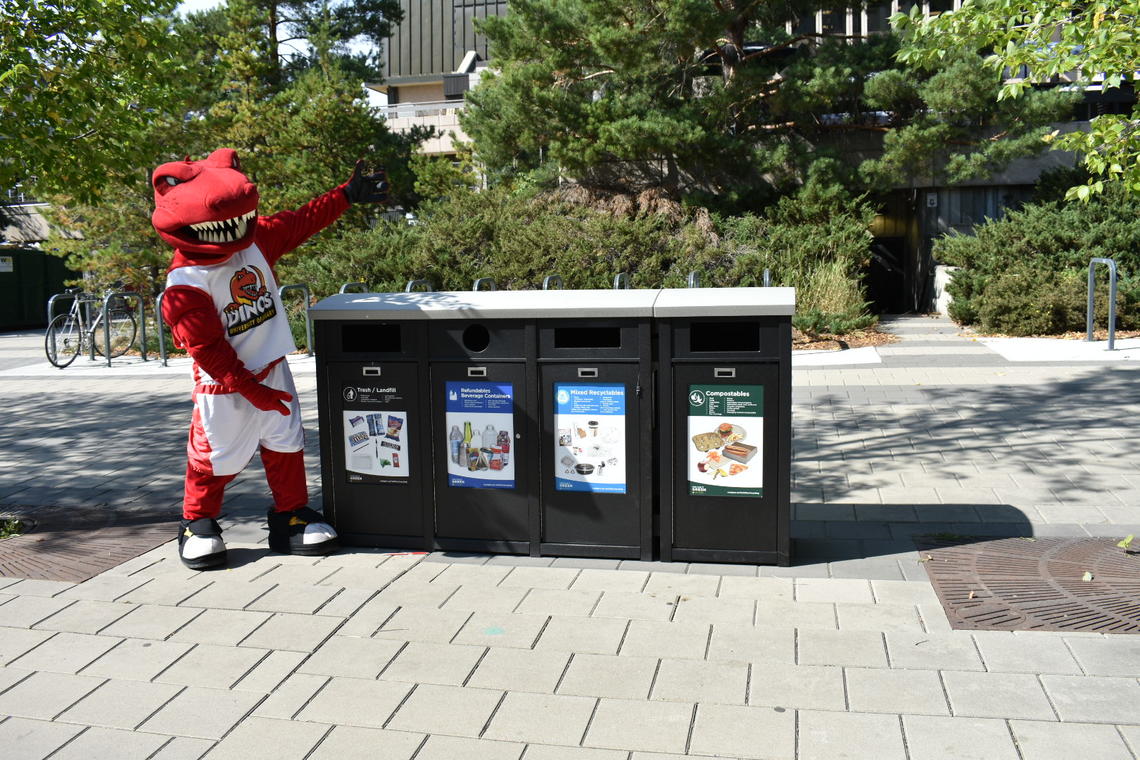Oct. 24, 2018
Electric cars, improved recycling and waste drive more sustainable campus operations

With a community of more than 30,000 students, faculty and staff at the University of Calgary, the day-to-day activities of the university have a big impact on our sustainability as a campus. The teams charged with operating and maintaining UCalgary’s physical environment are ensuring sustainability is part of campus life through continuous improvements, including two recent initiatives to help reduce our environmental footprint.
Electric additions made to UCalgary’s fleet
Members of the Facilities Management team saw an opportunity to help make campus operations more sustainable and jumped on it, recently adding four new electric cars to the university’s 170-vehicle fleet.
“We have all the right ingredients here on campus to go to electric,” says Lee Ferrari, the aptly named senior manager who looks after UCalgary’s fleet of vehicles and municipal services. “Our campus occupies a relatively small geographic area, our vehicles use minimal mileage getting around campus, and they always come back to home base each night where they can charge.”
On average, campus cars, trucks and vans each travel about 100 kilometres per week. On a single charge, the university’s new 2018 Volkswagen eGolfs can travel about 200 km based on Natural Resources Canada guidelines, meaning one charge can last up to two weeks for campus vehicles. Charging takes around 26 to 29 hours, and no charging station is required since the cars are able to plug into any 120-volt socket.

Under the hood of one of the University of Calgary's electric cars.
Riley Brandt, University of Calgary
“This is a step forward in improving our campus operations in a sustainable way,” says Ferrari. “Electric vehicles help reduce emissions and are a more efficient and sustainable mode of getting our Facilities team around as they support and maintain UCalgary’s campuses every day.”
The four new cars will reduce CO2 emissions by approximately 45,000 kilograms over the course of their life cycle at the university compared to gas-powered vehicles. The cars also cost around 90 per cent less to operate than gas-powered vehicles, and with no oil changes or engine maintenance required, the service costs are less than half of those of gas-powered vehicles.
“By the time we start our next phase of life-cycle vehicle replacement down the road, we’d definitely look at adding more electric vehicles,” says Ferrari.
Even if you don’t have an electric car, you can help contribute to reducing greenhouse gases (GHG). Students, faculty and staff who drive to campus or get picked up and dropped off can also help to make the campus greener by turning off engines as they wait. Being idle-free helps reduce GHGs, improves air quality and saves fuel.

Help sort out your waste by using the various bins that are available everywhere across campus.
University Relations
All waste has its place
The move to standardized recycling and waste bins is also contributing to more sustainable campus operations: compost, mixed recycling, refundable beverage container and trash bins are now accessible wherever you are on campus. Outside bins are already in place, and new indoor bins are coming this winter.
As UCalgary strives to become a zero-waste community, the simple act of disposing of your waste in the proper stream can have big impacts.
“Nearly 90 per cent of the daily waste we produce can be recycled or composted if it’s placed in the correct bin,” says Steven Gasser, associate vice-president, facilities management. “Right now, more than half is going to the landfill, and we need this to change.”
By 2020, the university is committed to diverting 80 per cent of its waste from the landfill — and reaching this goal is a community effort. Here are a few tips you can follow to help keep UCalgary green:
- Know what goes where. Sorting items properly and making sure containers are emptied of food and drink as best as possible can help prevent the contamination of recycling bins, which can lead to their contents being sent to the landfill.
- Keep food, plant and animal waste out of the landfill by using the composting bins to dispose of organic waste. Don’t forget to compost food containers from Mac Hall; all vendors use compostable clamshell containers.
- Cups and beverage containers can be confusing to sort and are often disposed of incorrectly. Check out the video below to see what to do with your cup. Better yet, bring your own cup from home and get a discount at participating vendors.
By leading the energy revolution, growing food security and protecting water resources, the University of Calgary is building a better future for all. Discover more of our sustainability success stories here.
